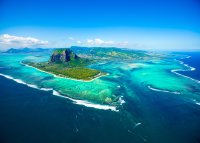Remote islands throughout the world house rather special communities of animals and plants. In order to colonise an isolated island a species must pass three great challenges. The first challenge is to arrange transportation, the second to establish a stable population upon arrival, and the third to adapt to the island’s habitats. At each stage the chance of failure is high, but with luck, and a certain degree of ‘evolutionary skill’, some inevitably succeed.
Species arrive on remote islands either by ‘active’ means, such as swimming or flying, or by ‘passive’ means, such as floating with ocean and air currents or hitching a ride on or in another individual. This degree of mobility is not available to all animal and plant groups, hence on isolated archipelagos there is often a characteristic assemblage of flying animals such as birds, bats and insects, light animals such as spiders and micro-organisms, buoyant animals such as tortoises and snakes, and plants employing edible seeds such as fruit trees, airborne seeds such as grasses, or floating seeds such as the coconut palm. Large land mammals, amphibians and freshwater fish have obvious difficulties in colonising remote islands and are therefore often absent, unless introduced by humans.
Assuming the problem of transport is overcome, there is then the task of establishing a permanent population on the island. Pioneers with the highest chance of success are single pregnant females, or in the case of plants, individuals able to self-fertilise. Flying species may arrive en masse, while species carried by currents must chance successive landings on the same island.
As populations establish, the animal and plant community begins to exploit the island’s resources, and some animals take on very unusual roles in the community, but one role that is left vacant is that of the large, fierce predator at the top of the food chain. Large predators need a lot of space and a lot of resources. Without an extensive range there simply isn’t enough food to support a population of such animals. Hence, on all but the largest of islands, large predators are absent, leaving meat-eating to smaller, less demanding species.
The absence of large predators has a profound effect on species that are normally on their menu – their worries are over. Ground-foraging birds, with no need for a quick escape, tend to lose the ability to fly, marooning themselves in the process. The downfall of Mauritius’s most famous former resident, the dodo, was a lack of fear, evidence of its worry-free lifestyle. Even where flightless birds are absent today, most remote islands have had them in the past. Island giants, such as the giant tortoises which used to wander through the Mauritius scrub, are also indications of a short food chain. Free from predators, but in stiff competition with each other, the bigger, stronger individuals tend to survive and the smaller, meeker ones don’t, so that, over time, the population attains giant proportions.
Although a remote island offers unusual opportunities, it cannot carry an infinite number of animals and plants. As each new population arrives, the competition for food and space increases, and the community has to adjust. The pressure to adapt is intense and species change their characteristics dramatically in a short time. Less mobile species such as inland birds and plants, isolated from their mainland ancestors, soon spread throughout the various habitats found on the island and gradually adapt to each one; after a period of time the original founding species evolves into a string of new species. This explains why many of the animals and plants found on remote islands are endemics – types found nowhere else in the world.
Inevitably, at some point, after repeated immigrations, an island ‘fills up’ – the diversity of species reaches a maximum and there is literally ‘no room at the inn’. Biologists have found that the number of species that any one island can support depends on several factors. The size of the island is the most influential of these. Larger islands, not surprisingly, can cater for more species, but the number of different habitats is also important. Islands that have forests, lagoons, lakes, scrub and cliffs, simply offer more opportunities than those covered in one type of vegetation, and consequently sustain more species. Nevertheless, at some point the island will be full, and from this moment on any new arrival will either perish from lack of food or be forced to usurp one of the residents – an act that leads to extinction. The rate at which species immigrate and cause such disruption is determined by the remoteness of the island. Islands distant from other lands experience few new arrivals and hence suffer extinctions less frequently. Islands near to a mainland have far more disruption, receiving new species and losing old ones at a daunting rate.
The remoteness of the Mascarenes protected the islands from excessive immigrations for millions of years, while the size of Mauritius and Réunion nurtured a diverse community. Then we arrived, in a wave similar to any other immigration. Like large predators, we needed space and resources too, but unlike the predators, we made sure that we got what we needed. We chopped down forests and introduced our favourite species, animals and plants that would never have been able to overcome the three challenges of island colonisation. Exposed to the new, advanced species from the mainland, the island community quickly lost many of its older residents in an event more profoundly disruptive than any witnessed by these islands since their abrupt beginnings.














